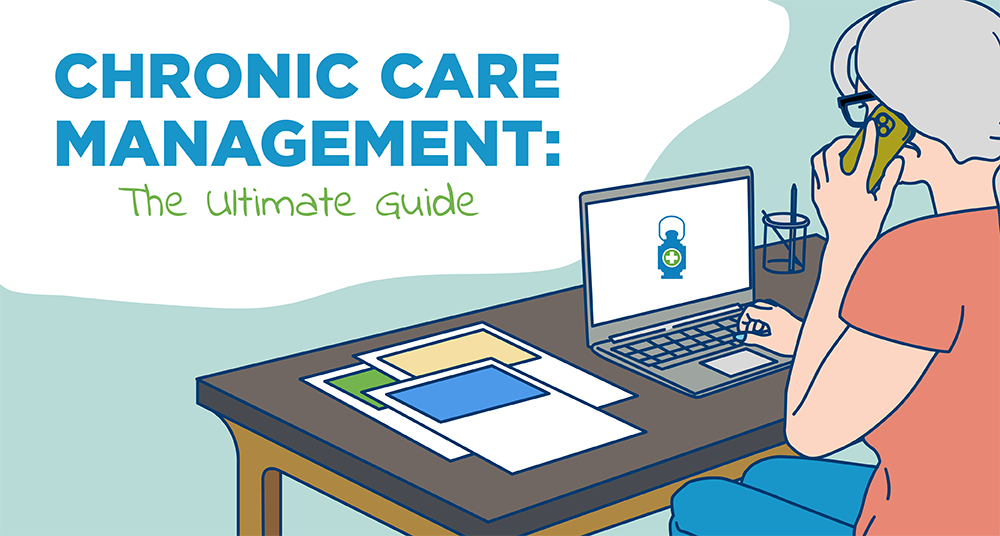 Chronic care management (CCM) is a remote care program designed to provide comprehensive and coordinated care for individuals living with multiple chronic conditions and comorbidities. It is a proactive and patient-centered strategy that focuses on improving outcomes, quality of life, and lowering costs for patients in the program. Unlike traditional episodic care, where healthcare providers primarily address acute symptoms or immediate health concerns, chronic care management takes a holistic and long-term perspective for some of the most serious health conditions.
Chronic care management (CCM) is a remote care program designed to provide comprehensive and coordinated care for individuals living with multiple chronic conditions and comorbidities. It is a proactive and patient-centered strategy that focuses on improving outcomes, quality of life, and lowering costs for patients in the program. Unlike traditional episodic care, where healthcare providers primarily address acute symptoms or immediate health concerns, chronic care management takes a holistic and long-term perspective for some of the most serious health conditions.
At its core, chronic care management recognizes that chronic diseases are often complex and multifaceted, requiring ongoing monitoring, treatment, and support. These conditions typically persist for an extended period and may require primary care interventions related to both medical & social determinants of health (SDOH), as well as a combination of lifestyle modifications, community resources, and patient education. Chronic care management aims to bridge the gap between healthcare visits and empower patients to actively engage in their own care.
Key Elements of Chronic Care Management:
Care Coordination:
One of the fundamental aspects of chronic care management is the coordination of healthcare services across multiple providers and settings. This includes primary care physicians, specialists, nurses, pharmacists, caregivers & family members, and other healthcare professionals involved in the patient’s care. Proper and timely care coordination ensures that information flows smoothly, treatments are aligned, and the patient receives consistent and cohesive care.
Personalized Care Plans:
Chronic care management emphasizes the development of personalized care plans tailored to each patient’s unique needs and circumstances. CCM care plans are living documents, routinely updated, that outline specific goals, treatment strategies, and self-management techniques to address the individual’s chronic condition effectively. They take into account factors such as the patient’s medical history, physician’s notes, SDOH needs, lifestyle, preferences, and social support network.
Regular Monitoring and Follow-up:
CCM involves regular monitoring and follow-up to track the patient’s progress, adjust treatments as necessary, and deliver timely primary care interventions. This may include scheduling office & same-day sick visits, facilitating completion of annual wellness goals, performing required assessments, medication reconciliation, telehealth consultations, remote monitoring technologies, and frequent communication between the patient and their healthcare team. Continuous monitoring helps detect changes in the patient’s health status, enabling timely interventions and proactive management.
Patient Education and Self-Management:
Empowering patients with knowledge and skills to manage their chronic conditions is a crucial component of chronic care management. Education on topics such as medication management, symptom recognition, healthy lifestyle choices, and coping strategies equips patients with the tools to actively participate in their care. By promoting self-management, chronic care management aims to enhance patient engagement, improve treatment adherence, and foster a sense of control over their health.
Engagement of Providers & Practice Staff:
Effective Chronic Care Management relies on the active engagement of healthcare providers and practice staff. They collaborate seamlessly to deliver patient-centered care, receive specialized training, ensure efficient communication, and embrace technology for improved patient outcomes. This engagement enhances care coordination and strengthens the overall CCM process.
In the next section of this guide, we will delve deeper into the patient side of things.










 Chronic care management
Chronic care management  To patients, when CCM is implemented properly, enrolling in a chronic care management program means access to a dedicated nurse, connected directly to their primary care physician, providing personalized care on a monthly basis to help them better manage their conditions in between office visits to avoid ending up in the ED. It recognizes that living with a chronic disease can significantly impact their daily lives, and CCM aims to support them in becoming more engaged in their own healthcare, but without having to leave the comfort of their own home.
To patients, when CCM is implemented properly, enrolling in a chronic care management program means access to a dedicated nurse, connected directly to their primary care physician, providing personalized care on a monthly basis to help them better manage their conditions in between office visits to avoid ending up in the ED. It recognizes that living with a chronic disease can significantly impact their daily lives, and CCM aims to support them in becoming more engaged in their own healthcare, but without having to leave the comfort of their own home. The primary goal of chronic care management is to improve patient quality, improve patient experience and lower total cost of care for patients living with multiple chronic conditions and comorbidities. It aims to achieve this by providing comprehensive, coordinated, and patient-centered care that goes beyond simply treating acute symptoms or immediate health concerns. The overarching objectives of CCM include:
The primary goal of chronic care management is to improve patient quality, improve patient experience and lower total cost of care for patients living with multiple chronic conditions and comorbidities. It aims to achieve this by providing comprehensive, coordinated, and patient-centered care that goes beyond simply treating acute symptoms or immediate health concerns. The overarching objectives of CCM include: Yes, when implemented correctly, a chronic care management program is always worth it for both patients and healthcare providers. Here are some reasons why a CCM program can be invaluable to health systems & providers:
Yes, when implemented correctly, a chronic care management program is always worth it for both patients and healthcare providers. Here are some reasons why a CCM program can be invaluable to health systems & providers: Chronic care management is designed to support individuals with two or more chronic conditions that require ongoing management. On average, 75% of Medicare patients will meet this criteria. And while specific diagnoses can vary slightly depending on healthcare settings and guidelines, the following are common examples of conditions that qualify for CCM:
Chronic care management is designed to support individuals with two or more chronic conditions that require ongoing management. On average, 75% of Medicare patients will meet this criteria. And while specific diagnoses can vary slightly depending on healthcare settings and guidelines, the following are common examples of conditions that qualify for CCM: There are two core components to consider enrolling patients in CCM:
There are two core components to consider enrolling patients in CCM: